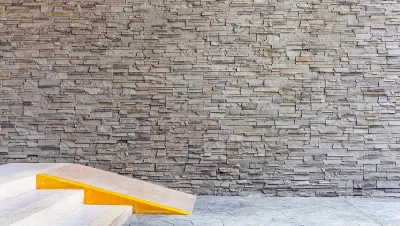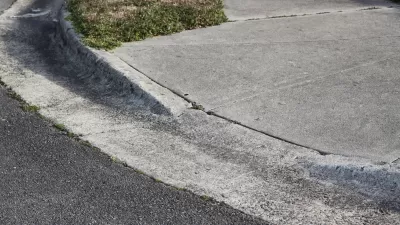Next City examines the fruits of a Department of Justice effort to force cities to bring their sidewalks and other public spaces into compliance with the Americans with Disabilities Act.

"A generation after the Americans with Disabilities Act, cities across the United States are still broadly inaccessible to many who live in them," according to an article by Anna Clark.
To describe the consequences of that inaccessibility, Clark writes: "According to 2010 census data, 56.7 million Americans have a disability. Yet, infrastructure that many citizens barely notice presents barriers and sends a disturbing, albeit inadvertent, message to their neighbors: You don’t belong here."
Yet people with disabilities still have one powerful counter-measure to the inattention to access: litigation. As a case study, Clark examines Cedar Rapids, Iowa, where the city adopted a much more Americans with Disabilities Act-friendly approach when "the Department of Justice began questioning the city’s overall ADA compliance" as the city rebuilt following the devastating floods of 2008. Clark calls especially on the expertise of Cedar Rapids Assistant City Manager Sandi Fowler and Des Moines-based non-profit Disability Rights Matter on what it takes to make a city accessible for everyone.
Also, for the record, Clark adds that the "Cedar Rapids settlement is one of more than 215 DOJ agreements of its kind under Project Civic Access, including 15 settlements nationwide last year." The long-read article thus has many additional case studies to choose from, such as Los Angeles, which "last year pledged to spend $1.3 billion over three decades for massive infrastructure improvements — including fixing notoriously crumbling sidewalks — to meet ADA accessibility standards."
FULL STORY: Suing for Sidewalks

Planetizen Federal Action Tracker
A weekly monitor of how Trump’s orders and actions are impacting planners and planning in America.

Maui's Vacation Rental Debate Turns Ugly
Verbal attacks, misinformation campaigns and fistfights plague a high-stakes debate to convert thousands of vacation rentals into long-term housing.

San Francisco Suspends Traffic Calming Amidst Record Deaths
Citing “a challenging fiscal landscape,” the city will cease the program on the heels of 42 traffic deaths, including 24 pedestrians.

Defunct Pittsburgh Power Plant to Become Residential Tower
A decommissioned steam heat plant will be redeveloped into almost 100 affordable housing units.

Trump Prompts Restructuring of Transportation Research Board in “Unprecedented Overreach”
The TRB has eliminated more than half of its committees including those focused on climate, equity, and cities.

Amtrak Rolls Out New Orleans to Alabama “Mardi Gras” Train
The new service will operate morning and evening departures between Mobile and New Orleans.
Urban Design for Planners 1: Software Tools
This six-course series explores essential urban design concepts using open source software and equips planners with the tools they need to participate fully in the urban design process.
Planning for Universal Design
Learn the tools for implementing Universal Design in planning regulations.
Heyer Gruel & Associates PA
JM Goldson LLC
Custer County Colorado
City of Camden Redevelopment Agency
City of Astoria
Transportation Research & Education Center (TREC) at Portland State University
Jefferson Parish Government
Camden Redevelopment Agency
City of Claremont




























